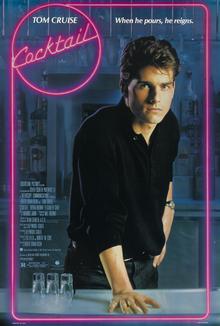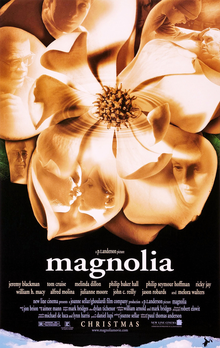
Magnolia is a 1999 American epic psychological drama film written, directed and co-produced by Paul Thomas Anderson. It stars an ensemble cast, including Jeremy Blackman, Tom Cruise, Melinda Dillon, Philip Baker Hall, Philip Seymour Hoffman, Ricky Jay, William H. Macy, Alfred Molina, Julianne Moore, John C. Reilly, Jason Robards and Melora Walters. The film is an epic mosaic of interrelated characters in search of happiness, forgiveness and meaning in the San Fernando Valley. The script was inspired by the music of Aimee Mann, who contributed several songs to its soundtrack.

The Wedding Singer is a 1998 American romantic comedy film directed by Frank Coraci, written by Tim Herlihy, and produced by Robert Simonds and Jack Giarraputo. The film stars Adam Sandler, Drew Barrymore, Christina Pickles and Christine Taylor, and tells the story of a wedding singer in 1985 who falls in love with a waitress. The film was released on February 13, 1998. Produced on a budget of US$18 million, it grossed $123 million worldwide and received generally positive reviews from critics. It is often ranked as one of Sandler's best comedies.

Say Anything... is a 1989 American teen romantic comedy drama film written and directed by Cameron Crowe. The film follows the romance between Lloyd Dobler, an average student, and Diane Court, the class valedictorian, immediately after their graduation from high school.

Vision Quest is a 1985 American coming-of-age romantic drama film starring Matthew Modine, Linda Fiorentino, Michael Schoeffling and Ronny Cox. It is based on Terry Davis's 1979 novel of the same name. Modine plays a Spokane high school wrestler who falls in love with an older woman, an aspiring artist from New Jersey on her way to San Francisco.

The Fabulous Baker Boys is a 1989 American romantic comedy-drama musical film written and directed by Steve Kloves. The film follows a piano duo consisting of brothers Jack and Frank Baker, who hire an attractive singer named Susie Diamond to revive their waning career. After a period of success, complications ensue when the younger brother develops a romantic interest in the singer.

Road House is a 1989 American action film directed by Rowdy Herrington and starring Patrick Swayze as a cooler at a newly refurbished roadside bar who protects a small town in Missouri from a corrupt businessman. Sam Elliott co-stars as a bouncer, the mentor, friend, and foil of Swayze's character. The cast also includes Kelly Lynch as Swayze's love interest and Ben Gazzara as the main antagonist. A direct sequel, Road House 2, was released in 2006. A remake of the film, starring Jake Gyllenhaal and directed by Doug Liman, is set to be released on Prime Video on March 21, 2024.

Crossing Delancey is a 1988 American romantic comedy film adapted by Susan Sandler from her play of the same name, and directed by Joan Micklin Silver. It stars Amy Irving and Peter Riegert. The film also features performances from Reizl Bozyk, David Hyde-Pierce, Sylvia Miles and Rosemary Harris. Amy Irving was nominated for a Golden Globe for the film, for Best Actress in a Motion Picture - Comedy or Musical.

Doug Stanhope is an American stand-up comedian, author, actor, political activist and podcast host. His stand-up material favors caustic and often obscene observations of life in the style of Bill Hicks, which he delivers while consuming alcohol. Politically, he has favored libertarianism and once endorsed the Free State Project, a proposed political migration of at least 20,000 libertarians to a single low-population state to foster libertarian ideas.
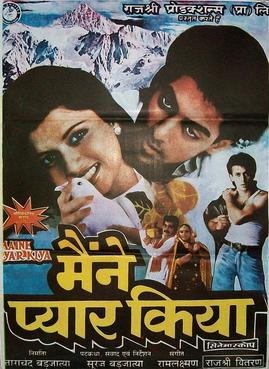
Maine Pyar Kiya is a 1989 Indian Hindi-language romantic musical film directed by Sooraj Barjatya, who co-wrote the film with S.M. Ahale. Produced by Rajshri Productions, the film stars Salman Khan and Bhagyashree. It marked the debuts of Barjatya and Bhagyashree. Principal photography took place in Mumbai and Ooty. The film score and soundtrack was composed by Raamlaxman while Asad Bhopali wrote the lyrics.

The Cutting Edge is a 1992 American sports-romantic comedy film directed by Paul Michael Glaser and written by Tony Gilroy. The plot is about a wealthy, spoiled figure skater who is paired with an injury-sidelined ice hockey player for Olympic figure skating. Competing at the 1992 Winter Olympics in Albertville, France, they have a climactic face off against a Soviet pair. It spawned a film series including a number of sequels. The film was primarily shot in Toronto and Hamilton, Ontario, Canada. The film has come to be known as a cult classic.
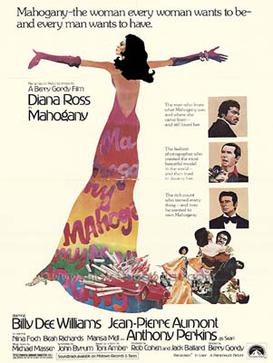
Mahogany is a 1975 American romantic drama film directed by Berry Gordy and produced by Motown Productions. The Motown founder Gordy took over the film direction after British filmmaker Tony Richardson was dismissed from the film. Mahogany stars Diana Ross as Tracy Chambers, a struggling fashion design student who rises to become a popular fashion designer in Rome. It was released on October 8, 1975. The soundtrack included the single "Theme from Mahogany", which peaked at number-one on the Billboard Hot 100 chart in January 1976.

Coyote Ugly is a 2000 American musical comedy-drama film based on the Coyote Ugly Saloon. It was directed by David McNally, produced by Jerry Bruckheimer and Chad Oman, and written by Gina Wendkos. Set in New York City, the film stars Piper Perabo in her breakthrough role, Adam Garcia, Maria Bello, Melanie Lynskey, and John Goodman with supporting roles performed by Izabella Miko, Bridget Moynahan, and Tyra Banks as Coyote Ugly bartenders.

Secret Dreams and Forbidden Fire is the sixth studio album by Welsh singer Bonnie Tyler, released in April 1986 by CBS/Columbia Records as the follow-up to her fifth studio album, Faster Than the Speed of Night (1983). Three years in the making, Secret Dreams and Forbidden Fire was executive-produced by Jim Steinman, who had produced Tyler's previous album. Seven singles were released from the album, with "Holding Out for a Hero" originally being released two years in advance on the movie soundtrack album Footloose. Tyler's album features collaborations with songwriters and guest artists including Desmond Child and Todd Rundgren.
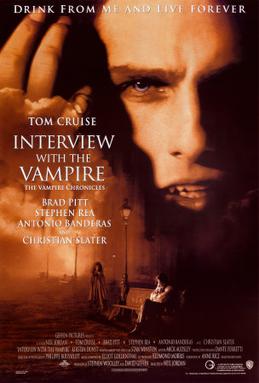
Interview with the Vampire is a 1994 American gothic horror film directed by Neil Jordan, based on Anne Rice's 1976 novel of the same name, and starring Tom Cruise and Brad Pitt. It focuses on Lestat (Cruise) and Louis (Pitt), beginning with Louis' transformation into a vampire by Lestat in 1791. The film chronicles their time together, and their turning of young Claudia into a vampire. The narrative is framed by a present-day interview, in which Louis tells his story to a San Francisco reporter. The supporting cast features Antonio Banderas and Stephen Rea.
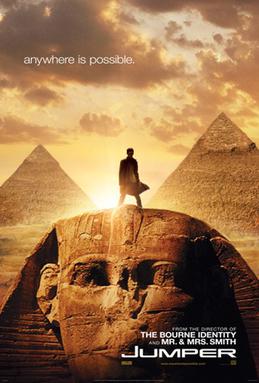
Jumper is a 2008 American science fiction action film loosely based on Steven Gould's 1992 novel of the same name. Directed by Doug Liman, the film stars Hayden Christensen as a young man capable of teleporting, as he is chased by a secret society intent on killing him. Jamie Bell, Rachel Bilson, Max Thieriot, AnnaSophia Robb, Diane Lane, Michael Rooker, and Samuel L. Jackson also star.

She's Out of Control is a 1989 American independent coming of age comedy film directed by Stan Dragoti. Starring Tony Danza, Ami Dolenz and Catherine Hicks. The original music score was composed by Alan Silvestri. The film was marketed with the tagline "She was Daddy's little girl. Now she's at that age when girls go wild, guys go crazy and Dads go nuts". The film was shot with the working title Daddy's Little Girl.

Pink Cadillac is a 1989 American action comedy film directed by Buddy Van Horn, about a bounty hunter and a group of white supremacists chasing after an innocent woman who tries to outrun everyone in her husband's prized pink Cadillac. The film stars Clint Eastwood and Bernadette Peters and also has small cameo appearances by Jim Carrey and Bryan Adams. Pink Cadillac marks the third and final collaboration between Eastwood and director Buddy Van Horn, following Any Which Way You Can (1980) and The Dead Pool (1988), as well as Van Horn's final film as a director and Eastwood's final comedy film.
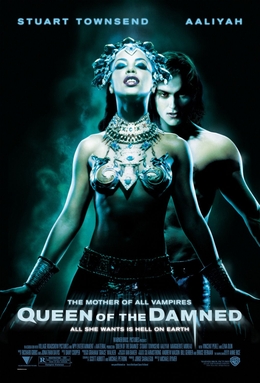
Queen of the Damned is a 2002 horror film directed by Michael Rymer from a screenplay by Scott Abbott and Michael Petroni, and based on the 1988 novel The Queen of the Damned by Anne Rice, the third novel of the book series The Vampire Chronicles, although the film contains many plot elements from the novel's 1985 predecessor, The Vampire Lestat. A stand-alone sequel to Interview with the Vampire (1994), the film stars Stuart Townsend, Aaliyah, Marguerite Moreau, Vincent Pérez, and Lena Olin. Townsend and Matthew Newton replaced Tom Cruise and Antonio Banderas in the roles of Lestat and Armand, respectively.

One Way Passage is a 1932 American pre-Code romantic film starring William Powell and Kay Francis as star-crossed lovers, directed by Tay Garnett and released by Warner Bros. The screenplay by Wilson Mizner and Joseph Jackson is based on a story by Robert Lord, who won the Academy Award for Best Story.

Elena Jane Goulding is an English singer and songwriter. Her career began when she met record producers Starsmith and Frankmusik, and she was later spotted by Jamie Lillywhite, who became her manager and A&R. After signing to Polydor Records in July 2009, Goulding released her debut extended play, An Introduction to Ellie Goulding, later that year.
